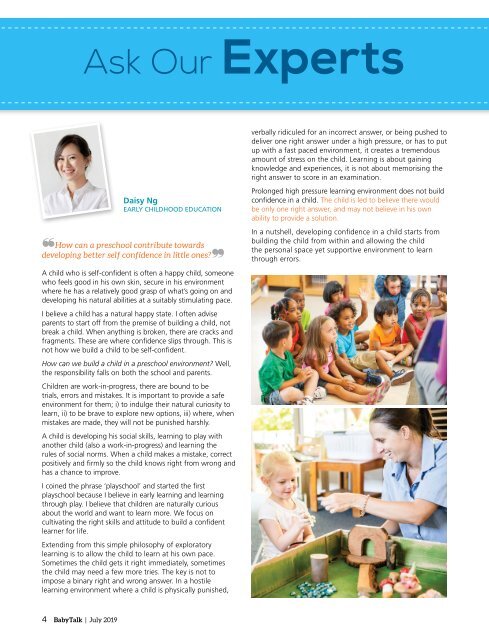You also want an ePaper? Increase the reach of your titles
YUMPU automatically turns print PDFs into web optimized ePapers that Google loves.
Ask Our Experts<br />
verbally ridiculed for an incorrect answer, or being pushed to<br />
deliver one right answer under a high pressure, or has to put<br />
up with a fast paced environment, it creates a tremendous<br />
amount of stress on the child. Learning is about gaining<br />
knowledge and experiences, it is not about memorising the<br />
right answer to score in an examination.<br />
Daisy Ng<br />
EARLY CHILDHOOD EDUCATION<br />
}<br />
How can a preschool contribute towards<br />
developing better self confidence in little ones? ~<br />
Prolonged high pressure learning environment does not build<br />
confidence in a child. The child is led to believe there would<br />
be only one right answer, and may not believe in his own<br />
ability to provide a solution.<br />
In a nutshell, developing confidence in a child starts from<br />
building the child from within and allowing the child<br />
the personal space yet supportive environment to learn<br />
through errors.<br />
A child who is self-confident is often a happy child, someone<br />
who feels good in his own skin, secure in his environment<br />
where he has a relatively good grasp of what’s going on and<br />
developing his natural abilities at a suitably stimulating pace.<br />
I believe a child has a natural happy state. I often advise<br />
parents to start off from the premise of building a child, not<br />
break a child. When anything is broken, there are cracks and<br />
fragments. These are where confidence slips through. This is<br />
not how we build a child to be self-confident.<br />
How can we build a child in a preschool environment? Well,<br />
the responsibility falls on both the school and parents.<br />
Children are work-in-progress, there are bound to be<br />
trials, errors and mistakes. It is important to provide a safe<br />
environment for them; i) to indulge their natural curiosity to<br />
learn, ii) to be brave to explore new options, iii) where, when<br />
mistakes are made, they will not be punished harshly.<br />
A child is developing his social skills, learning to play with<br />
another child (also a work-in-progress) and learning the<br />
rules of social norms. When a child makes a mistake, correct<br />
positively and firmly so the child knows right from wrong and<br />
has a chance to improve.<br />
I coined the phrase ‘playschool’ and started the first<br />
playschool because I believe in early learning and learning<br />
through play. I believe that children are naturally curious<br />
about the world and want to learn more. We focus on<br />
cultivating the right skills and attitude to build a confident<br />
learner for life.<br />
Extending from this simple philosophy of exploratory<br />
learning is to allow the child to learn at his own pace.<br />
Sometimes the child gets it right immediately, sometimes<br />
the child may need a few more tries. The key is not to<br />
impose a binary right and wrong answer. In a hostile<br />
learning environment where a child is physically punished,<br />
4 BabyTalk | <strong>July</strong> <strong>2019</strong>

















